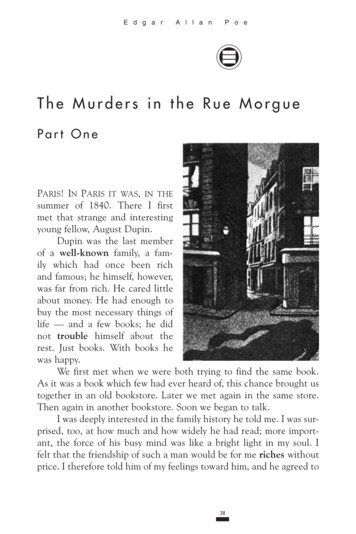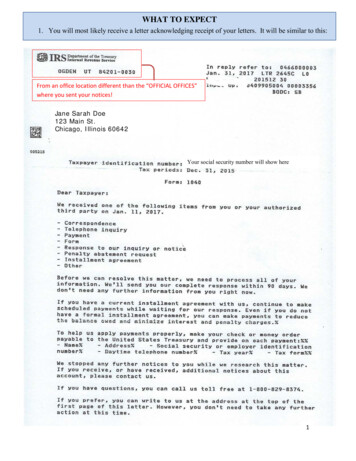
Transcription
E d g a rA l l a nP o epThe Murders in the Rue MorguePart OneParis! In Paris it was, in thesummer of 1840. There I firstmet that strange and interestingyoung fellow, August Dupin.Dupin was the last memberof a well-known family, a family which had once been richand famous; he himself, however,was far from rich. He cared littleabout money. He had enough tobuy the most necessary things oflife — and a few books; he didnot trouble himself about therest. Just books. With books hewas happy.We first met when we were both trying to find the same book.As it was a book which few had ever heard of, this chance brought ustogether in an old bookstore. Later we met again in the same store.Then again in another bookstore. Soon we began to talk.I was deeply interested in the family history he told me. I was surprised, too, at how much and how widely he had read; more important, the force of his busy mind was like a bright light in my soul. Ifelt that the friendship of such a man would be for me riches withoutprice. I therefore told him of my feelings toward him, and he agreed to38
E d g a rA l l a nP o e :S t o r y t e l l e rcome and live with me. He would have, I thought, the joy of using mymany fine books. And I would have the pleasure of having someonewith me, for I was not happy alone.We passed the days reading, writing and talking. But Dupin was alover of the night, and at night, often with only the light of the starsto show us the way, we walked the streets of Paris, sometimes talking,sometimes quiet, always thinking.I soon noticed a special reasoning power he had, an unusualreasoning power. Using it gave him great pleasure. He told me once,with a soft and quiet laugh, that most men have windows over theirhearts; through these he could see into their souls. Then, he surprisedme by telling what he knew about my own soul; and I found that heknew things about me that I had thought only I could possibly know.His manner at these moments was cold and distant. His eyes lookedempty and far away, and his voice became high and nervous. At suchtimes it seemed to me that I saw not just Dupin, but two Dupins —one who coldly put things together, and another who just as coldlytook them apart.One night we were walking down one of Paris’s long and dirtystreets. Both of us were busy with our thoughts. Neither had spokenfor perhaps fifteen minutes. It seemed as if we had each forgotten thatthe other was there, at his side. I soon learned that Dupin had notforgotten me, however. Suddenly he said:“You’re right. He is a very little fellow, that’s true, and he wouldbe more successful if he acted in lighter, less serious plays.”“Yes, there can be no doubt of that!” I said.At first I saw nothing strange in this. Dupin had agreed with me,with my own thoughts. This, of course, seemed to me quite natural.For a few seconds I continued walking, and thinking; but suddenlyI realized that Dupin had agreed with something which was only athought. I had not spoken a single word. I stopped walking and turnedto my friend. “Dupin,” I said, “Dupin, this is beyond my understanding. How could you know that I was thinking of .” Here I stopped, inorder to test him, to learn if he really did know my unspoken thoughts.“How did I know you were thinking of Chantilly? Why do youstop? You were thinking that Chantilly is too small for the plays inwhich he acts.”39
E d g a rA l l a nP o e“That is indeed what I was thinking. But, tell me, in Heaven’sname, the method — if method there is — by which you have beenable to see into my soul in this matter.”“It was the fruit-seller.”“Fruit-seller!? I know no fruit-seller.”“I mean the man who ran into you as we entered this street — itmay have been ten or fifteen minutes ago, perhaps less.”“Yes; yes, that’s true, I remember now. A fruit-seller, carrying alarge basket of apples on his head, almost threw me down. But I don’tunderstand why the fruit-seller should make me think of Chantilly —or, if he did, how you can know that.”“I will explain. Listen closely now:“Let us follow your thoughts from the fruit-seller to the play-actor, Chantilly. Those thoughts must have gone like this: from thefruit-seller to the cobblestones, from the cobblestones to stereotomy,and from stereotomy to Epicurus, to Orion, and then to Chantilly.“As we turned into this street the fruit-seller, walking very quickly past us, ran against you and made you step on some cobblestoneswhich had not been put down evenly, and I could see that the stoneshad hurt your foot. You spoke a few angry words to yourself, and continued walking. But you kept looking down, down at the cobblestonesin the street, so I knew you were still thinking of stones.“Then we came to a small street where they are putting downstreet stones which they have cut in a new and very special way. Hereyour face became brighter and I saw your lips move. I could not doubtthat you were saying the word stereotomy, the name for this new wayof cutting stones. It is a strange word, isn’t it? But you will rememberthat we read about it in the newspaper only yesterday. I thought thatthe word stereotomy must make you think of that old Greek writernamed Epicurus, who wrote of something he called atoms; he believedthat the world and everything in the heavens above are made of theseatoms.“Not long ago you and I were talking about Epicurus and hisideas, his atoms, ideas which Epicurus wrote about more than 2,000years ago. We were talking about how much those old ideas are liketoday’s ideas about the earth and the stars and the sky. I felt sure thatyou would look up to the sky. You did look up. Now I was certain that40
E d g a rA l l a nP o e :S t o r y t e l l e rI had been following your thoughts as they had in fact come into yourmind. I too looked up, and saw that the group of stars we call Orion isvery bright and clear tonight. I knew you would notice this, and thinkabout the name Orion.“Now follow my thoughts carefully. Only yesterday, in the newspaper, there was an article about the actor Chantilly, an article whichwas not friendly to Chantilly, not friendly at all. We noticed that thewriter of the article had used some words taken from a book we bothhad read. These words were about Orion. So I knew you would puttogether the two ideas of Orion and Chantilly. I saw you smile, remembering that article and the hard words in it.“Then I saw you stand straighter, as tall as you could make yourself. I was sure you were thinking of Chantilly’s size, and especially hisheight. He is small; he is short. And so I spoke, saying that he is indeeda very little fellow, this Chantilly, and he would be more successful ifhe acted in lighter, less serious plays.”I will not say that I was surprised. I was more than surprised; Iwas astonished. Dupin was right, as right as he could be. Those werein fact my thoughts, my unspoken thoughts, as my mind moved fromone thought to the next. But if I was astonished by this, I would soonbe more than astonished.One morning this strangely interesting man showed me onceagain his unusual reasoning power. We heard that an old woman hadbeen killed by unknown persons. The killer, or the killers, had cuther head off — and escaped into the night. Who was this killer, thismurderer? The police had no answer. They had looked everywhereand found nothing that helped them. They did not know what to donext. And so — they did nothing.But not Dupin. He knew what to do.41
E d g a rA l l a nP o epThe Murders in the Rue MorgueP a r t Tw oIt was in Paris in the summerof 1840 that I met August Dupin.He was an unusually interestingyoung man with a busy, forcefulmind. This mind could, it seemed,look right through a man’s bodyinto his soul, and uncover hisdeepest thoughts. Sometimes heseemed to be not one, but twopeople — one who coldly putthings together, and another whojust as coldly took them apart.One morning, in the heat ofthe summer, Dupin showed me once again his special reasoning power.We read in the newspaper about a terrible killing. An old woman andher daughter, living alone in an old house in the Rue Morgue, hadbeen killed in the middle of the night:Paris, July 7, 1840. In the early morning today the people in thewestern part of the city were awakened from their sleep by cries ofterror, which came, it seemed, from a house in the street called theRue Morgue. The only persons living in the house were an old woman,Mrs. L’Espanaye, and her daughter. Several neighbors and a policeman ran toward the house, but by the time they reached it the cries hadstopped. When no one answered their calls, they forced the door open.42
E d g a rA l l a nP o e :S t o r y t e l l e rAs they rushed in they heard voices, two voices; they seemed to comefrom above. The group hurried from room to room, but they foundnothing until they reached the fourth floor. There they found a doorthat was firmly closed, locked, with the key inside. Quick ly they forcedthe door open, and they saw spread be fore them a bloody sickeningscene — a scene of horror!The room was in the wildest possible order — broken chairs and tableswere lying all around the room. There was only one bed, and from iteverything had been taken and thrown into the middle of the floor.There was blood everywhere, on the floor, on the bed, on the walls. Asharp knife covered with blood was lying on the floor. In front of thefireplace there was some long gray hair, also bloody; it seemed to havebeen pulled from a human head. On the floor were four pieces of gold,an earring, several objects made of silver, and two bags containing alarge amount of money in gold. Clothes had been thrown around theroom. A box was found under the bed covers. It was open, and heldonly a few old letters and papers.There was no one there — or so it seemed. Above the fireplace theyfound the dead body of the daughter; it had been put up into theopening where the smoke escapes to the sky. The body was still warm.There was blood on the face, and on the neck there were dark, deepmarks which seemed to have been made by strong fingers. These markssurely show how the daughter was killed.After hunting in every part of the house without finding anythingmore, the group went outside. Behind the building they found the bodyof the old woman. Her neck was almost cut through, and when theytried to lift her up, her head fell off.The next day the newspaper offered to its readers these new facts:The Murders in the Rue Morgue. —Paris, July 8, 1840. The policehave talked with many people about the terrible killings in the oldhouse on the Rue Morgue but nothing has been learned to answer thequestion of who the killers were.43
E d g a rA l l a nP o ePauline Dubourg, a washwoman, says she has known both of thedead women for more than three years, and has washed their clothesduring that period. The old lady and her daughter seemed to love eachother dearly. They always paid her well. She did not know where theirmoney came from, she said. She never met anyone in the house. Onlythe two women lived on the fourth floor.Pierre Moreau, a shopkeeper, says Mrs. L’Espanaye had bought foodat his shop for nearly four years. She owned the house and had livedin it for more than six years. People said they had money. He neversaw anyone enter the door except the old lady and her daughter, anda doctor eight or ten times, perhaps.Many other persons, neighbors, said the same thing. Almost no oneever went into the house and Mrs. L’Espanaye and her daughter werenot often seen.Jules Mignaud, a banker, says that Mrs. L’Espanaye had put money inhis bank, beginning eight years before. Three days before her death shetook out of the bank a large amount of money, in gold. A man fromthe bank carried it for her to her house.Isidore Muset, a policeman, says that he was with the group that firstentered the house. While he was going up the stairs he heard two voices, one low and soft, and one hard, high, and very strange — the voiceof someone who was certainly not French, the voice of a foreigner.Spanish perhaps. It was not a woman’s voice. He could not understandwhat it said. But the low voice, the softer voice, said, in French, “MyGod!”Alfonso Garcia, who is Spanish and lives on the Rue Morgue, says heentered the house but did not go up the stairs; he is nervous and he wasafraid he might be ill. He heard the voices. He believes the high voicewas not that of a Frenchman. Perhaps it was English; but he doesn’tunderstand English, so he is not sure.44
E d g a rA l l a nP o e :S t o r y t e l l e rWilliam Bird, another foreigner, an Englishman, says he was one ofthe persons who entered the house. He has lived in Paris for two years.He heard the voices. The low voice was that of a Frenchman, he wassure, because he heard it say, in French, “My God!” The high voicewas very loud. He is sure it was not the voice of an Englishman, northe voice of a Frenchman. It seemed to be that of an Italian. It mighthave been a woman’s voice. He does not understand Italian.Mr. Alberto Montani, an Italian, was passing the house at the timeof the cries. He says that they lasted for about two minutes. Theywere screams, long and loud, terrible, fearful sounds. Montani, whospeaks Spanish but not French, says that he also heard two voices. Hethought both voices were French. But he could not understand any ofthe words spoken.The persons who first entered the house all agree that the door of theroom where the daughter’s body was found was locked on the inside.When they reached the door everything was quiet. When they forcedthe door open they saw no one. The windows were closed and firmlylocked on the inside. There are no steps that someone could have gonedown while they were going up. They say that the openings over thefireplace are too small for anyone to have escaped through them. Ittook four or five people to pull the daughter’s body out of the opening over the fireplace. A careful search was made through the wholehouse. It was four or five minutes from the time they heard the voicesto the moment they forced open the door of the room.Paul Dumas, a doctor, says that he was called to see the bodies soonafter they were found. They were in a horrible condition, badly markedand broken. Such results could not have come from a woman’s hands,only from those of a very powerful man. The daughter had been killedby strong hands around her neck.The police have learned nothing more than this. A killing as strange asthis has never before happened in Paris. The police do not know whereto begin to look for the answer.45
E d g a rA l l a nP o eWhen we had finished reading the newspaper’s account of themurders neither Dupin nor myself said anything for a while. But Icould see in his eyes that cold, empty look which told me that hismind was working busily. When he asked me what I thought of allthis, I could only agree with all Paris. I told him I considered it a verydifficult problem — a mystery, to which it was not possible to find ananswer. No, no, said Dupin.“No, I think you are wrong. A mystery it is, yes. But there mustbe an answer. Let us go to the house and see what we can see. Theremust be an answer. There must!”46
E d g a rA l l a nP o e :S t o r y t e l l e rpThe Murders in the Rue MorguePart ThreeIt was in Paris that I metAugust Dupin. He was an un usuallyinteresting young man with a busy,forceful mind. This mind could, itseemed, look right through a man’sbody into his deepest soul.One hot summer morning weread in the newspapers about aterrible killing. The dead personswere an old woman and her unmarried daughter, who lived alone onthe fourth floor of an old house onthe street called the Rue Morgue.Someone had taken thedaughter’s neck in hispowerful fingers andpressed with fearful strength until her life was gone. Her mother’sbody was found outside, behind the house, with the head nearly cutoff. The knife with which she was killed was found, however, in theroom, on the floor.Several neighbors ran to the house when they heard the women’scries of fear. As they ran up to the fourth floor they heard two othervoices. But when they reached the room and broke down the doorthey found no living person in the room. Like the door, the two47
E d g a rA l l a nP o ewindows were firmly closed, locked on the inside. There was no otherway that the killer could have got in or out of the room.The Paris police did not know where to begin to look for theanswer. I told Dupin that it seemed to me that it was not possible tolearn the answer to the mystery of these killings. No, no, said Dupin.“No; I think you are wrong. A mystery it is, yes. But there mustbe an answer. We must not judge what is possible just by what we haveread in the newspapers. The Paris police work hard and often get goodresults; but there is no real method in what they do. When somethingmore than simple hard work is needed, when a little real method isneeded, the police fail. Sometimes they stand too near the problem.Often, if a person looks at something very closely he can see a fewthings more clearly, but the shape of the whole thing escapes him.“There must be an answer! There must! Let us go to the houseand see what we can see. I know the head of the police, and he willallow us to do so. And this will be interesting and give us some pleasure.”I thought it strange that Dupin should believe we would get pleasure out of this. But I said nothing.It was late in the afternoon when we reached the house on theRue Morgue. It was easily found for there were still many persons — infact, a crowd, standing there looking at it. Before going in we walkedall around it, and Dupin carefully looked at the neighboring houses aswell as this one. I could not understand the reason for such great care.We came again to the front of the house and went in. We wentup the stairs into the room where the daughter’s body had beenfound. Both bodies were there. The police had left the room as theyhad found it. I saw nothing beyond what the newspaper had told us.Dupin looked with great care at every thing, at the bodies, the walls,the fireplace, the windows. Then we went home.Dupin said nothing. I could see the cold look in his eyes whichtold me that his mind was working, working busily, quickly. I asked noquestions.Dupin said nothing until the next morning, when he came intomy room and asked me suddenly if I had not no ticed something especially strange about what we saw at the house on the Rue Morgue. Ireplied: “Nothing more than we both read in the newspaper.”48
E d g a rA l l a nP o e :S t o r y t e l l e r“Tell me, my friend. How shall we explain the horrible force, theunusual strength used in these murders? And whose were the voicesthat were heard? No one was found except the dead women; yet therewas no way for anyone to escape. And the wild condition of the room;the body which was found head down above the fireplace; the terriblebroken appearance of the body of the old lady, with its head cut off;these are all so far from what might be expected that the police arestanding still; they don’t know where to begin.“These things are unusual, indeed; but they are not deepmysteries. We should not ask, ‘What has happened?’ but ‘What hashappened that has never happened before?’ In fact, the very thingsthat the police think cannot possibly be ex plained are the thingswhich will lead me to the answer. In deed, I believe they have alreadyled me to the answer.”I was so surprised I could not say a word. Dupin looked quicklyat the door. “I am now waiting for a person who will know somethingabout these murders, these wild killings. I do not think he did themhimself. But I think he will know the killer. I hope I am right aboutthis. If I am, then I expect to find the whole answer, today. I expectthe man here — in this room — at any moment. It is true that he maynot come; but he probably will.”“But who is this person? How did you find him?”“I’ll tell you. While we wait for this man we do not know — for Ihave never met him — while we wait, I will tell you how my thoughtswent.” Dupin began to talk. But it did not seem that he was trying toexplain to me what he had thought. It seemed that he was talking tohimself. He looked not at me, but at the wall.“It has been fully proved that the voices heard by the neighborswere not the voices of the women who were killed. Someone elsewas in the room. It is therefore certain that the old woman did notfirst kill her daughter and then kill herself. She would not have beenstrong enough to put her daughter’s body where it was found; and themanner of the old lady’s death shows that she could not have causedit herself. A per son can kill himself with a knife, yes. But he surelycannot cut his own head almost off, then drop the knife on the floorand jump out the window. It was murder, then, done by some thirdperson — or persons. And the voices heard were the voic es of these49
E d g a rA l l a nP o epersons. Let us now think carefully about the things people said aboutthose voices. Did you notice anything especially strange in what wastold about them?”“Well, yes. Everybody agreed that the low voice was the voice ofa Frenchman; but they could not agree about the high voice.”“Ah! That was what they said, yes; but that was not what wasso strange about what they said. You say you have noticed nothingthat makes their stories very different from what might have beenexpected. Yet there was something. All these persons, as you say,agreed about the low voice; but not about the high hard voice. Thestrange thing here is that when an Italian, an Englishman, a Spaniard,and a Frenchman tried to tell what the voice was like, each one saidit sounded like the voice of a foreigner. How strangely unusual thatvoice really must have been! Here are four men from four big coun tries, and not one of them could understand what the voice said; eachone gave it a different name.“Now, I know that there are other countries in the world. You willsay that perhaps it was the voice of someone from one of those otherlands — Russia, perhaps. But remem ber, not one of these people heardanything that sounded like a separate word.”Here Dupin turned and looked into my eyes.“This is what we have learned from the newspaper. I don’t knowwhat I have led you to think. But I believe that in this much of thestory there are enough facts to lead us in the one and only directionto the right answer. What this answer is, I will not say not yet. But Iwant you to keep in mind that this much was enough to tell me whatI must look for when we were in that house on the Rue Morgue. AndI found it!”50
E d g a rA l l a nP o e :S t o r y t e l l e rpThe Murders in the Rue MorguePart FourMurderers had come to the old house on the street calledthe Rue Morgue! Murderers had come and gone and left behind thedead bodies of an old woman and her daughter. The daughter’s bodywas in the bedroom on the fourth floor. The old woman was lyingoutside, behind the house, her head almost cut off; but the knifewhich killed her was up in the bedroom, on the floor. The door andthe windows were all firmly closed, locked on the inside; there was noway for anyone to go in or out. Voices had been heard. One voice wasspeaking in French; the other voice had not spoken even one wordthat anyone could understand. But there was no one in the roomwhen police arrived.This much we had learned from the newspapers, my friend Dupinand I. Interested by it, we had gone to look at the house and the bodies. Dupin was now explaining to me what he had learned there.“That is what we learned from the newspapers. Please rememberit; for that much was enough to tell me what I must look for when wewere in that house on the Rue Morgue. And I found it!“Let us now take ourselves again, in our thoughts, to the roomwhere the murders were done. What shall we first look for? The waythe murderers escaped. All right. We agree, I am sure, that we do nothave to look for anything outside of nature, for anything not havinga real form, a body. The killers were not spirits; they were real. Theycould not go through the walls. Then how did they escape? There isonly one way to reason on that subject, and it must lead us to theanswer. Let us look, one at a time, at the possible ways to escape. It is51
E d g a rA l l a nP o eclear that the killers were in the room where the daughter was found.From this room they must have escaped. How?“At first I saw no way out. It had been necessary for the neighbors to break down the door in order to enter the room. There was noother door. The opening above the fireplace is not big enough, nearthe top, for even a small animal. The murderers therefore must haveescaped through one of the windows. This may not seem possible. Wemust prove that it is possible.“There are two windows in the room. Both of them, you willremember, are made of two parts; to open the window one must lift upthe bottom half. One of these windows is easily seen; the lower part ofthe other is out of sight behind the big bed. I looked carefully at thefirst of these windows. It was firmly closed, fastened, like the door, onthe inside. To keep the window closed, to fasten it, someone had put astrong iron nail into the wood at the side of the window in such a waythat the window could not be raised. At least it seemed that the nailheld the window closed. The nail was easy to see. There it was. Andthe people who discovered the kil l ings used their greatest strengthand could not raise the win dow. I, too, tried to raise the window andcould not.“I went to the second window and looked behind the bed at thelower half of the window. There was a nail here, too, which held thewindow closed. Without moving the bed, I tried to open this windowalso, and again I could not do so.“I did not stop looking for an answer, however, because I knewthat what did not seem possible must be proved to be possible. Thekillers — or perhaps I should say, the killer, for I am almost certainthere was only one — the killer escaped through one of these windows. Of this I felt certain. After the murderer had left the bedroomhe could have closed the win dow from the outside; but he could nothave fastened it again on the inside. Yet anyone could see the nailswhich held the windows tightly closed. This was the fact that stoppedthe police. How could the murderer put the nail back in its place?”“Perhaps — perhaps if you pulled out the nail .”“Yes! That is just what I thought. Two things seemed clear: first,there had to be something wrong with the idea that the nails wereholding the windows closed. I didn’t know what was wrong. Something52
E d g a rA l l a nP o e :S t o r y t e l l e rwas. Second, if it was not the nails which were holding the windowsclosed, then something else was holding them closed, something hardto see, some thing hidden.“I went back to the first window. With great effort I pulled out thenail. Then I again tried to raise the window. It was still firmly closed.This did not surprise me. There had to be a hidden lock, I thought,inside the window. I felt the window carefully with my fingers. Indeed,I found a button which, when I pressed it, opened an inner lock. Withalmost no effort I raised the window.“Now I knew that the killer could close the window from outside and the window would lock itself. But there was still the nail.Carefully, I put the nail back into the hole from which I had taken it.Then I pressed the button and tried to raise the window. I could not.The nail also was holding the window closed!”“Then then the murderer could not possibly have gone out thewindow.”“He could not have gone out that window. Therefore, he musthave escaped through the other window. The other win dow was alsoheld closed by a nail. But I knew I must be right. Although no oneelse had looked carefully at the window behind the bed, I went to itand tried to see whether the two windows were in some way different.The nail in the second window looked the same as the one I had justseen. I moved the bed so that I could look closely. Yes. There was abutton here, too. I was so sure I was right that without touching thenail I pressed the button and tried to raise the window. Up it went!“As the window went up it carried with it the top part of the nail,the head. When I closed the window the head of the nail was againin its place. It looked just as it had looked before. I took the head ofthe nail in my fingers and it easily came away from the window. I sawthat the nail had been broken. But when I put the nail head back inits place, the nail again looked whole.“What seemed to be not possible we have proved to be possible.The murderer indeed escaped through that window. I could now see,in my mind, what had happened.“It was a hot summer night. When the murderer first arrivedhe found that window open, open to let some of the fresh night aircome in. Through the open window the mur derer went in and came53
E d g a rA l l a nP o eout again. As he came out he closed the window, perhaps with a purpose to do so, perhaps by chance. The special lock inside the windowheld the window firmly closed. The nail only seemed to be holding itclosed. And that which was possible looked not possible.”Dupin had been talking not to me, it seemed, but to himself.His cold eyes seemed to see only what was in his own mind. Now hestopped and looked straight at me. His eyes were now hard and bright.And I understood that using his unusual reasoning power to find theanswer to those bloody murders was giving Dupin great pleasure!At first I could think only of this. Then I said: “Dupin — thewindows are on the fourth floor, far above the ground. Even an openwindow .”“Yes. That is an interesting question: how did the mur derer gofrom the window down to the ground? Once I was quite certain thatthe murderer had in fact gone through that window the rest was notso hard to know. And the answer to this question told me still moreabout who the murderer was!“When you and I first came to the house on the Rue Morg
found the dead body of the daughter; it had been put up into the opening where the smoke escapes to the sky. The body was still warm. There was blood on the face, and on the neck there were dark, deep marks which seemed to have been made by strong fing











